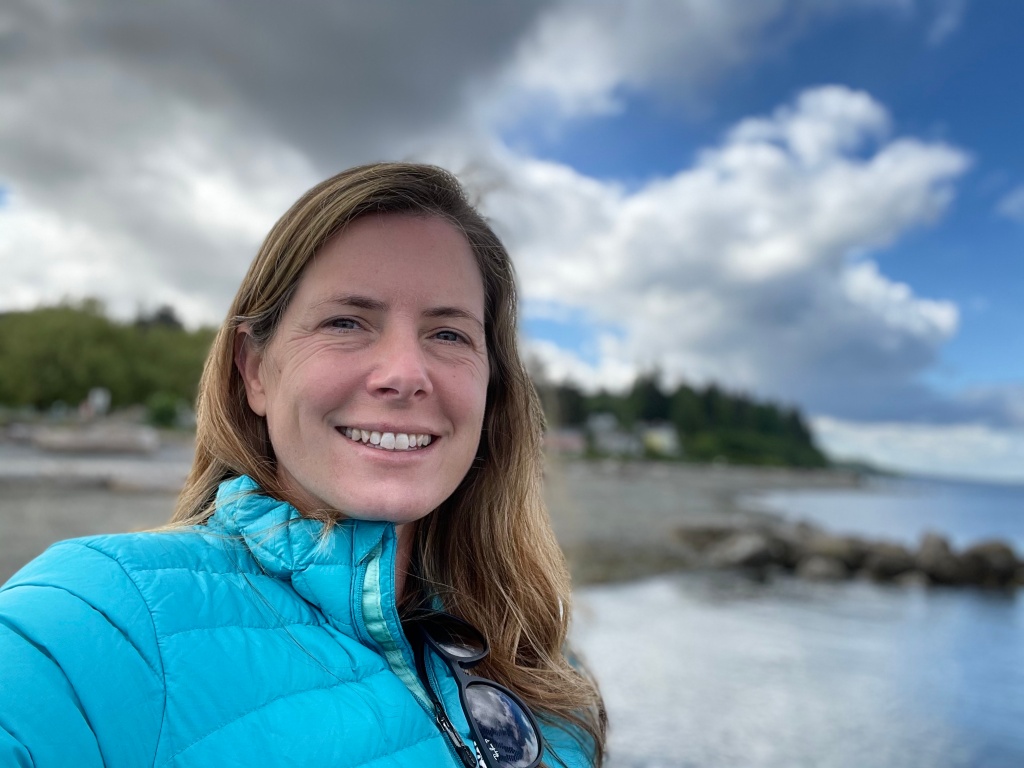
Dr. Susan E. Crow is an Associate Professor of Soil Ecology and Biogeochemistry in the Natural Resources and Environmental Management Department within the College of Tropical Agriculture and Human Resources and an affiliate of the Water Resources Research Center at the University of Hawaiʻi Mānoa. She studies the natural carbon cycle and human impacts on the soil environment and previously served on the state Greenhouse Gas Sequestration Task Force (formerly Carbon Farming Task Force) and is a Science Leadership Group member for the North American Carbon Program.
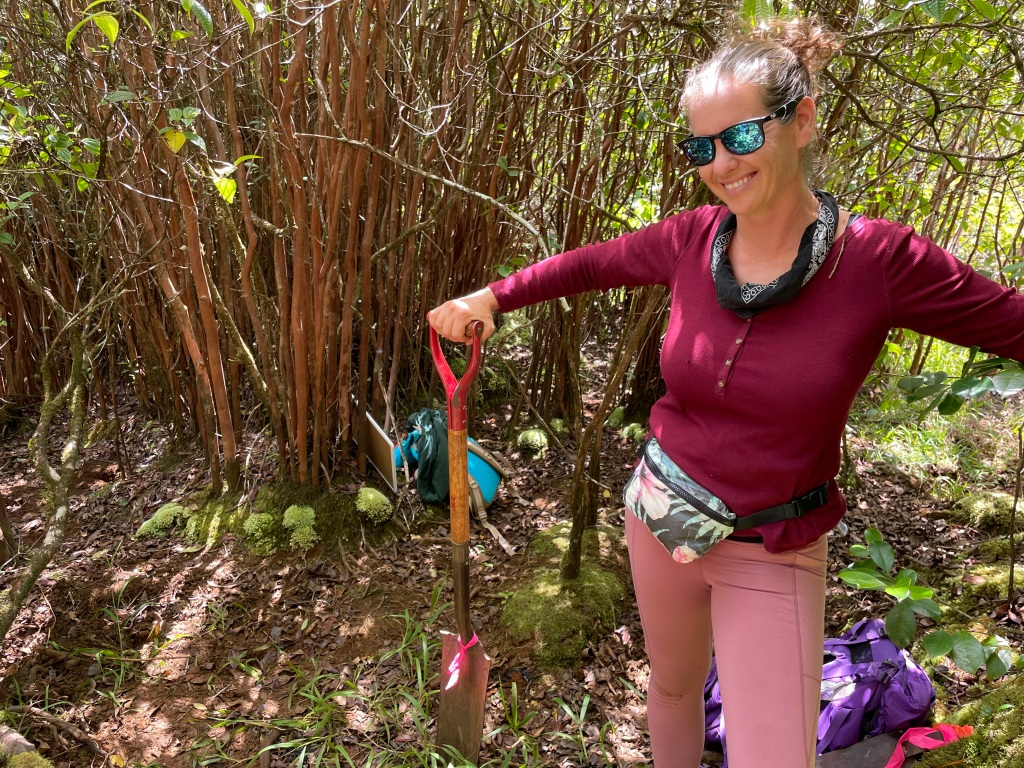
Christine Tallamy Glazer is the lead technician and lab manager of the Soil Ecology and Biogeochemistry lab since 2016. She received her MS in Marine Science from the University of Delaware and upon her arrival on Oahu in 2004, conducted biogeochemical research with stable isotopes to trace microbial nutrient cycles in recirculating aquaculture systems as a research associate at the Oceanic Institute. She then taught high school math and science for three years, before returning to lab as an analyst for the Biogeochemical Stable Isotope Facility at UH. Christine is certified as a Community Emergency Response Team member. She enjoys snorkeling, hiking, swimming, and spending time with her husband and two young children.
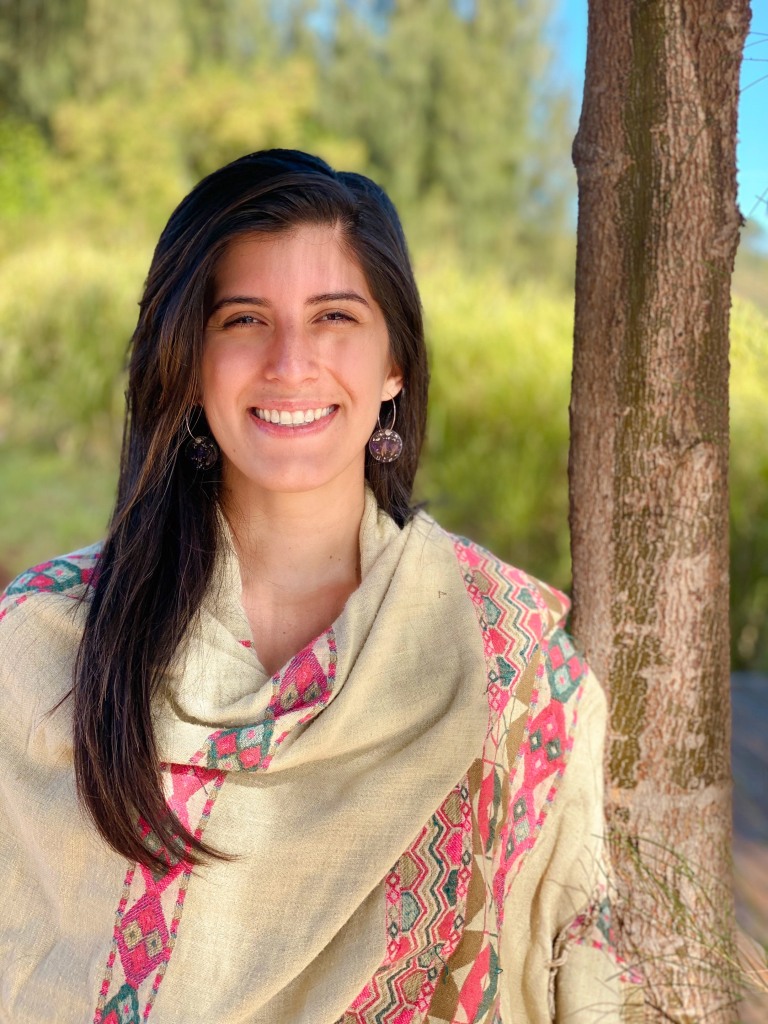
Dr. Johanie Rivera-Zayas (Postdoctoral Fellow) – Johanie focuses on soil nitrogen dynamics, soil microbial interactions, and greenhouse gas emissions. Her field experience encompasses soil, plant, and GHG dynamics in tropical, subtropical, and temperate systems. Among multiple roles, Johanie led the U.S. Climate Alliance funded project: On the path to carbon neutrality: a Hawai’i carbon land use opportunity assessment. The project goal is to maximize landscape-scale sequestration rates, through collaborations with stakeholders, resource managers, and local communities to develop a land-use classification map optimized for climate mitigation at the State of Hawai’i scale. Currently, Johanie is the project coordinator and researcher for two soil health-related projects in Hawai’i, Puerto Rico, American Samoa, and Pohnpei.
Current Students
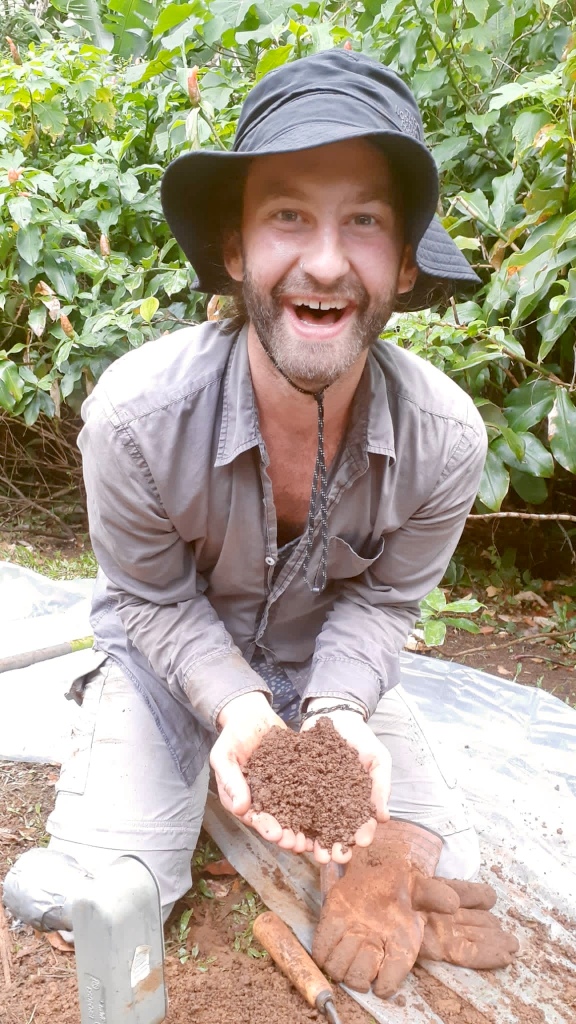
Tanner Beckstrom (he/him/his) (M.S.) – Originally from Minnesota, Tanner received his B.A. in Global Studies from the University of Minnesota-Twin Cities with minors in Soil Science and Spanish. He first became interested in sustainable land management while studying the socioeconomic benefits of urban agriculture as an undergraduate student. Upon graduation, he gained a deeper understanding of diversified farming systems while volunteering on an agroforestry project in Brazil and then working seasonally on small-scale farms in the Twin Cities metro area. In 2018, he joined the Jelinski Pedology Group at the University of Minnesota-Twin Cities, where he assisted a project that evaluated the ecosystem co-benefits of urban agriculture. Then between 2019-2021, he worked as a research assistant in the Grossman Soil Agroecology Lab, broadly exploring the effects of ecological land management on nutrient cycling and soil health. Tanner is beyond excited to be a part of the Soil Ecology & Biogeochemistry lab and to study the wonderfully diverse soils of Hawaiʻi.
Tanner’s research aims to explore the trajectory of soil health recovery in lands previously under intensive agriculture. His goal is to couple bench-based laboratory methods with mid-infrared spectroscopy to investigate the rate that soil health improves after the cessation of intensive agriculture. A better understanding of soil health recovery in Hawaiʻi’s diverse soil types will help producers monitor the effects of their management decisions on the health of their soil.
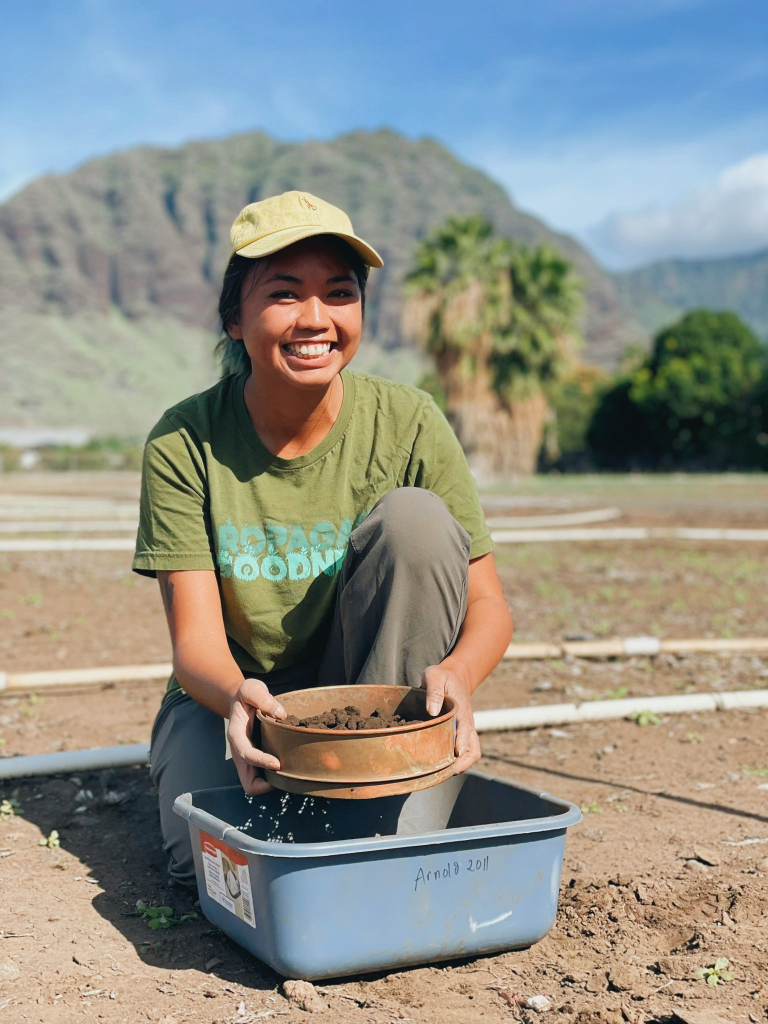
Kristina Estrada (M.S.) – Kristina is originally from Virginia Beach, VA, born and raised near the Chesapeake Bay. She graduated in 2018 with a B.S. in Crop and Soil Sciences at Virginia Tech, with a concentration in International Agriculture and minor in Horticulture, Global Food Security, and International Studies. After graduating she joined the Peace Corps, as an agriculture volunteer in the countryside of Paraguay at an agriculture focused high school co-facilitating classes with the local teachers and doing work within the greater community to promote sustainable agriculture and environmental education. The COVID-19 pandemic disrupted her assignment, but Kristina successfully applied to be an Americorps VISTA and spent the next year at the Lac Courtes Oreilles Ojibwe College Sustainable Agriculture Research Station (LCOOC SARS) as a sustainable agriculture specialist.
Amazing lessons of food sovereignty, ethnobotany, arts, and spirituality were offered at the research station, while the specialists implemented extension programming for youth and beginner farmers. Kristina spent the majority of her time with the community outdoors, working on the farm, foraging, walking through the Wisconsin Northwoods, and at the many lakes. Shortly after, she came to UH Manoa to begin her M.S. in Natural Resources and Environmental Management. In her research, she hopes to examine the effect of different levels of disturbance on soil health and thus yield and plant biodiversity in agroecosystems. The outcomes will hopefully serve as a starting point for future research of the relationship between above and below ground organisms and processes, as well as help land managers make decisions to reach their goals.
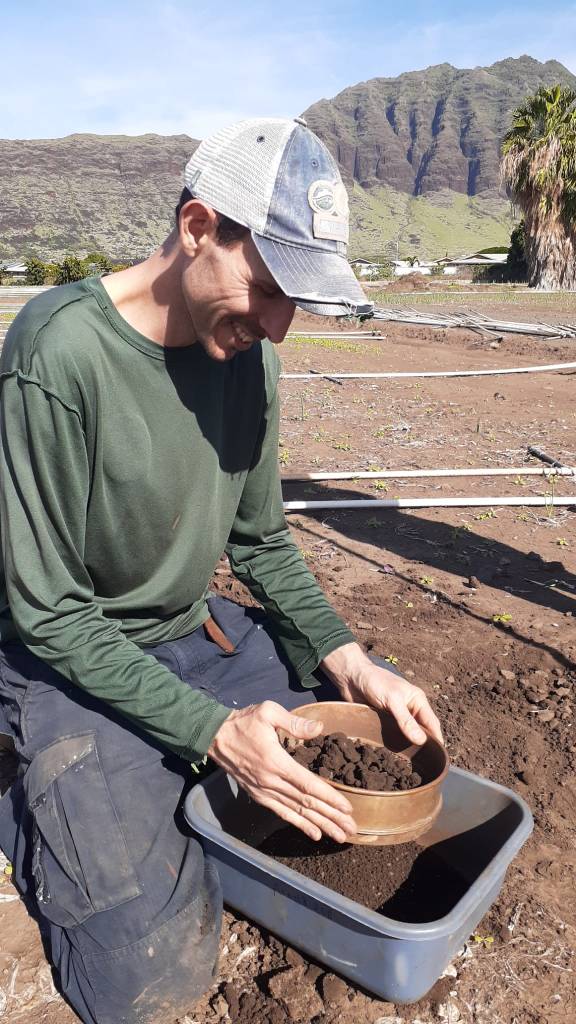
Sebastian Church (Ph.D.) – Sebastian studies farmer behavior in Hawai’i to improve the effectiveness of policies aiming to increase adoption of soil health practices. He also supports the collection, processing, and testing of soil samples for Dr. Crow’s soil lab. Born and raised in the county of (Miami) Dade, his professional experience ranges from dishwasher to environmental center docent to middle-school math interventionist to self-employed landscape contractor, with volunteer experience as a farm hand, master gardener and plant diagnostician. Sebastian likes to bike, grow food, read/watch dystopian stories, play collaborative board games, co-create art-in-life, engage with people from diverse backgrounds, travel, cook and seek self-knowledge.
Lab Alumni
Elaine Vizka (Graduate Assistant) – Elaine assisted with the initial assessment soil health status across the Hawaiian Islands to optimize soil health metrics for Hawaiʻi by discerning which metrics are critical factors across its diverse landscapes and is co-author on the resulting paper. She also mentored undergraduates through the Undergraduate Research Opportunities Program and received a student WSARE grant to understand which management practices are environmentally and economically viable for farmers.
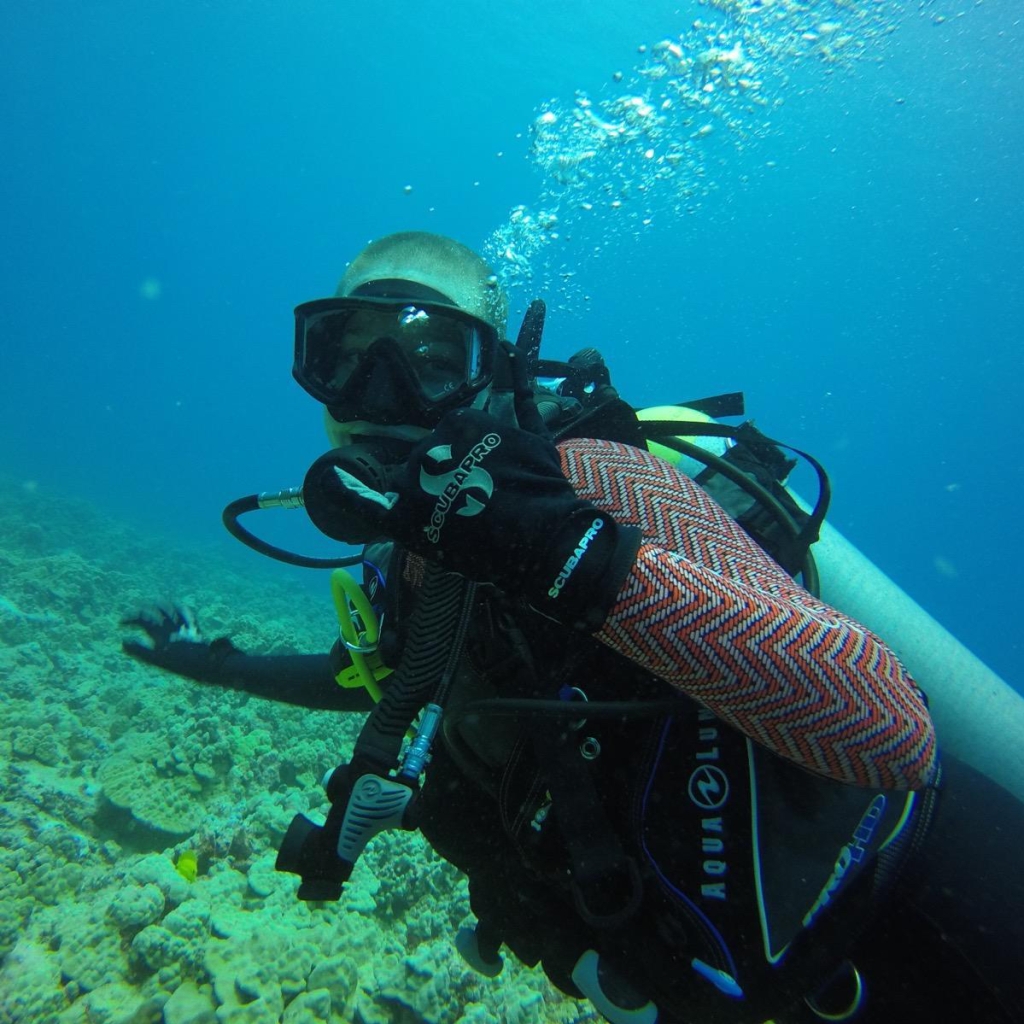
Ryan Ueunten (M.E.M 2021) – Ryan’s capstone “Evaluating Phytoremediation of Soils Contaminated with Lead in Lo‘i Agriculture” supported the dedicated people revitalizing the important practice of lo‘i agriculture. His work was funded by generous support from the Hauʻoli Mau Loa Foundation Fellowship program.
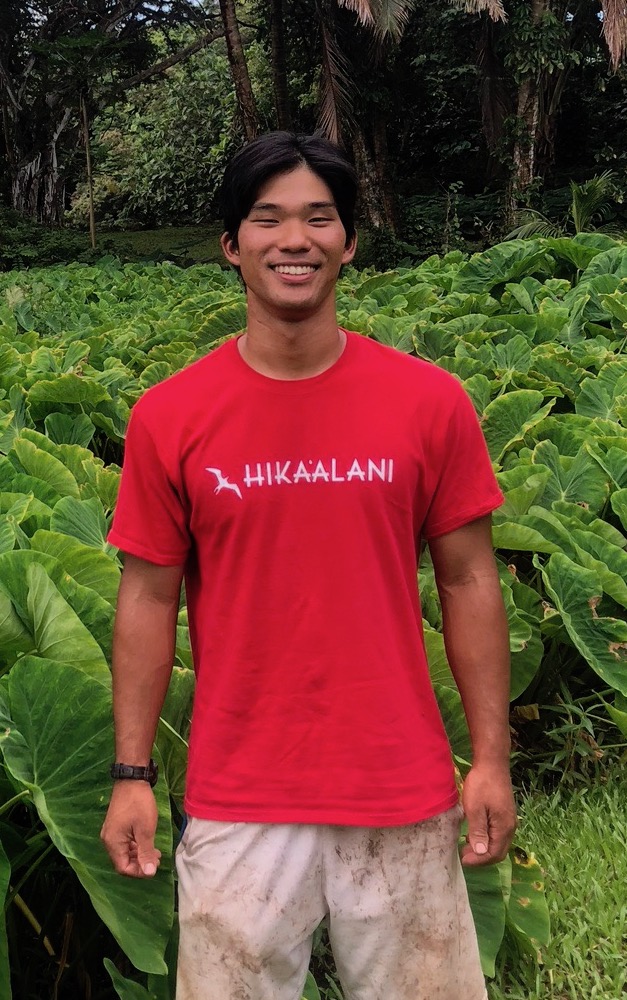
Alexis Kerver (M.E.M 2021) – Alexisʻ passion for reconnecting people to their environment was present in her capstone titled “Closing the loop between food, energy, and waste: A review of energy conversion configurations to support Hawaiʻiʻs transitions to a circular agro-economy“. Alexis received a graduate assistantship from the Office of Hawaiian Affairs to support the master plan for Kukaniloko.
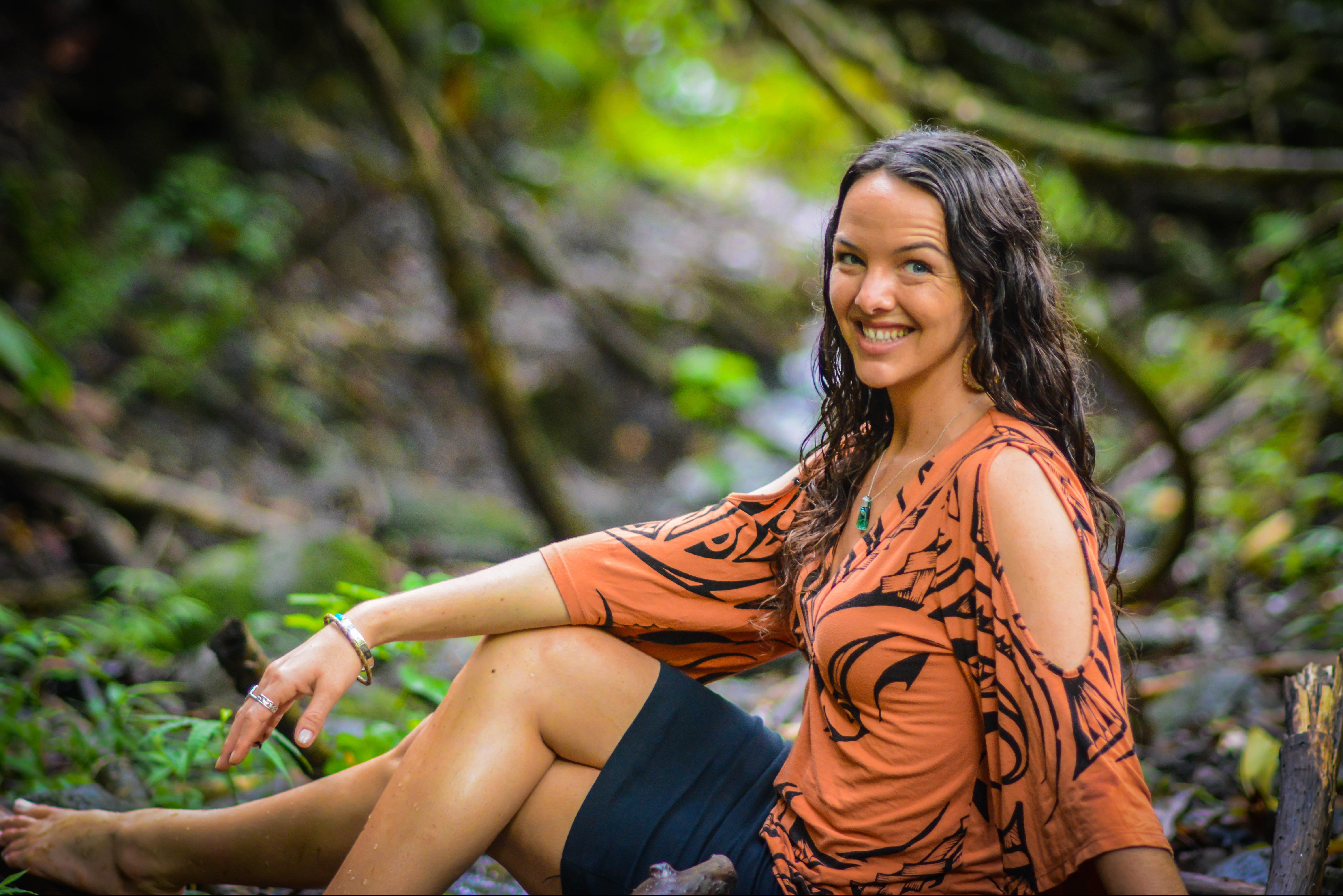
Jon Wells (Ph.D. 2019) – Jon aimed to improve the sustainability of bioenergy systems through efficient conversion and carbon economy. His dissertation was titled “Understanding carbon in large-scale agricultural production systems for bioenergy in the tropics: selecting soils, feedstocks, and conversion pathways”. After graduating, Dr. Wells joined Dr. Yiqi Luo’s research group as a postdoctoral researcher at Northern Arizona University.
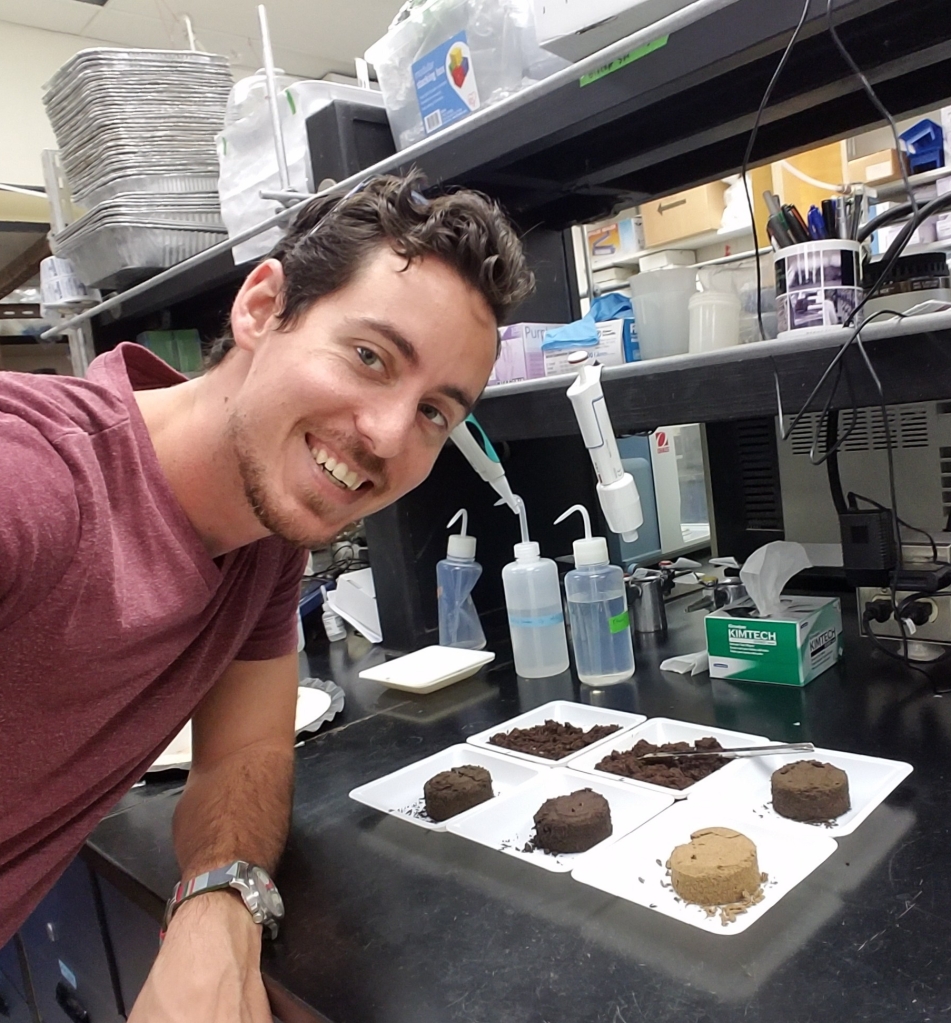
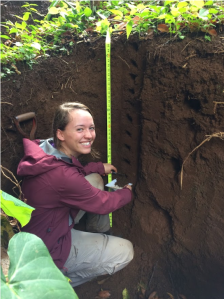
Casey McGrath (M.S. 2019) – For her M.S. Thesis, Casey established an innovative deep soil warming field experiment at the Lyon Arboretum in Hawaiʻi and measured ecosystem carbon flux for one year of heating. Unlike any deep soil warming experiment to date, there was no significant respiration response to augmented soil temperatures past the surface layer. Multimodal analysis confirmed the hypothesis that high concentrations of amorphous minerals were the primary driver of the lack of respiration response, followed by high relative soil moisture and low bacterial richness. Casey graduated in Fall 2019 with her M.S. and the journal Biogeochemistry published a paper developed from her thesis in 2022. After graduating, Casey moved onto a Post Masters Research Associate – Environmental Data Analyst position at the Department of Energy’s Pacific Northwest National Laboratory in Richland, WA.
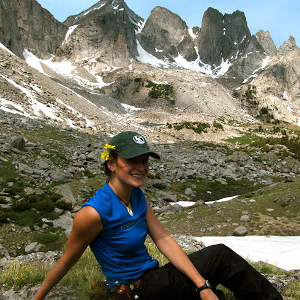
Hannah Hubanks – (M.S. 2019). “Towards a Hawaii soil health index: Identifying sensitive and practical indicators of change across land use and soil diversity.” Hannah’s thesis was an epic tour of the diversity in soils, land use, and management across the islands to determine the range of soil parameters that define a healthy soil in Hawaii. Her work resulted in a manageable, practical, and sensitive list of potential indicators of soil health across productive systems to develop into a soil health index. After graduating, Hannah was a soil health specialist for Oahu Resource Conservation and Development.
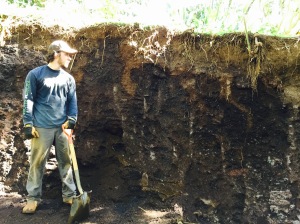
Daniel Richardson (M.S. 2019) – Originally from Oʻahu, Dan earned a B.S. from the NREM Department and continued his pursuit of research interests in soil microbiology, soil health, and the how soils can relate to global sustainability as a Master’s student. Dan still enjoys surfing, hiking, and digging holes. His inspiring thesis represented the start to our research group’s formal pivot to soil health. After graduating, Dan worked for Aloha Green.
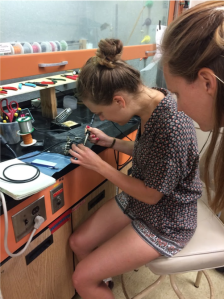
Mathilde Duvallet (intern) – visiting student of ecology and engineering from AgroParis Tech; originally from Normandy, France, Mathilde conducted her international internship requirement in the Crow Lab. She assisted in the connection of deep soil heating probes through a complex electrical network which creates heat within the deep soil profile using heating cable and installation of the novel temperature sensor network. The temperature network includes wiring the sensors to multiplexors to a data logger in order to collect temperature data. In addition, she assisted in the collection of soil cores, analysis of the microbial communities at the study sit and soil gas flux sampling.
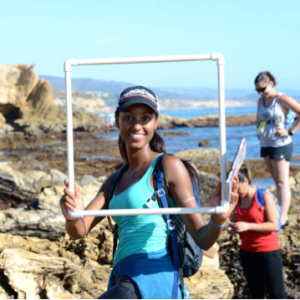
Genelle Watkins – (M.S. 2018). Interests in conservation and sustainability took Genelle to Pemba Island in East Africa where she worked with local communities to develop a strategy to conserve and restore mangrove forests to help maintain livelihoods. Her passion for sustainability and hope to better this planet through citizen science research that directly involves people and communities to make a positive global impact will take her far. After graduating, Genelle worked for Hawaii Green Growth developing content for the Aloha+ Challenge Dashboard.
Mika Sebastian intern, Mika conducted surveys of local producers on Oahu and Maui and photo documenting their stories about their land, crops, and what soil health means to each individual. A resulting web-based story board will help communicate the need for healthy soils for landscape resilience and thriving communities.
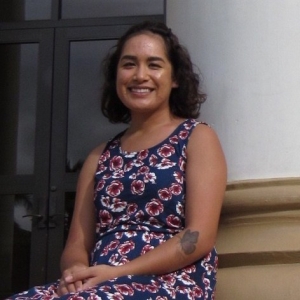
Kaelin Sylva B.S. 2018 NREM, Kaelin completed her internship assisting with field site planning, maintenance, and characterization for the deep soil warming project at the Lyon Arboretum and transitioned to research assistant, making everything run a little smoother for all of us in the Crow lab.
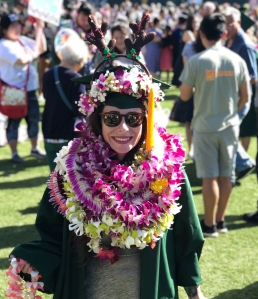
Annika Little B.S. 2017 NREM, Annika conducted her NREM internship in the Crow Lab and completed independent research on the distribution of biochar in soil aggregates in a zero-tillage perennial grass system. After graduating, she worked for the U.S. Army Medical Command in the Forensic Toxicology Drug Testing Laboratory and a Specimen Controller.
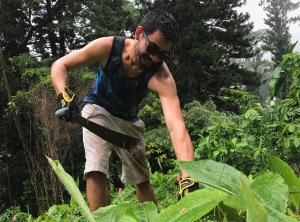
Steven Leone 2017, Steven worked with the Crow Lab throughout 2017 to help convert an overgrown jungle patch into a Deep Soil Warming field site for a long term, manipulative experiment to test the effect of warmer soil on ecosystem processes and carbon biogeochemistry. He developed the temperature sensor network for the field site at the Lyon Arboretum and this website.
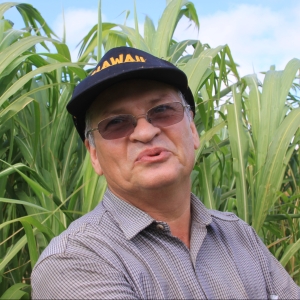
Adel Youkhana 2011-2016 Postdoctoral Researcher, Junior Researcher “Water and carbon footprint and plant parameters of biofuel production on the HC&S sugarcane lands on Maui, Hawaii”.
Lauren Deem M.S. 2016 NREM “Mechanistic understanding of improvements in yield and sustainability of biochar-amended soil”. After graduating, Lauren was hired as a Crop and Soil Scientist at Kuo Testing Labs, Othello, Washington.
Jabez Meulemans M.S. 2016 NREM “Systems approach to assessing the environmental and economic sustainability of food and fuel crops with biochar soil amendment”. After graduating, he became the Environmental Services Coordinator for Jefferson Country in Colorado (Denver area) tackling sustainability issues through renewable energy initiatives and water/energy efficiency and conservation projects.
Konni Biegert Institute of Soil Science and Land Evaluation, University of Hohenheim, Germany, M.S. 2015 “Biochar effects on greenhouse gas emission from two Hawaiian arable soils”.
Olivia Schubert Technician 2015-2016
Nancy Parker Technician 2015-2016
Michelle Lazaro M.S. 2015 NREM Recipient of the 2013 Hau‘oli Mau Loa Foundation Graduate Fellowship in NREM, “Optimization of baseline soil carbon stock assessment across the Hawaiian Islands”. Presidential Management Fellow (STEM) at the U.S. Forest Service, Pacific Northwest Research Station, Portland, OR. After graduating, Michelle became a Natural Resource Specialist, Inventory Reporting and Mapping Team, Resource Monitoring and Assessment Program at the same station.
Whitney Ray M.S. 2015 NREM “Greenhouse gas emission balance of biofuel feedstock for potential carbon trading”. After graduating, she became a Manager, Impact-Directed Environmental Accounts at National Fish and Wildlife Foundation, San Francisco, CA.
Hironao Yamazaki M.S. 2013 NREM “Alteration in soil carbon pools following land use and management change for bioenergy feedstock production”.
Meghan Pawlowski (Lind) M. S. NREM 2013 “Greenhouse gas flux and fine root dynamics of sugarcane and Napier grass under deficit irrigation”. Previously, an Environmental Specialist V for the Texas Department of Transportation. Currently an Ecologist/Project Manager for Cox-McLain Environmental Consulting, Inc., Austin, Texas.
Mataia Reeves M.S. 2012 “The potential carbon sequestration of Eucalyptus grandis in conjunction with its use as a biofuel feedstock”. After graduating, she became a Research Associate at Pioneer Hi-Bred, Waimea, HI.
Yudai Sumiyoshi M.S. 2012 “Belowground carbon cycle of Napier and Guinea grasses grown for sustainable biofuel feedstock production”, degree awarded December 2012. Awarded “Best NREM Master’s Student Presentation” at the 2011 CTAHR Student Research Symposium. Awarded “2011 Outstanding Student Paper Award” from the Biogeosciences Section of the American Geophysical Union.
Visiting Scholars:
Martin A. Sampson Benavides
Undergraduate Research Assistants and Interns Alumni:
Valerie M. Fajotina · Katherine Hiu · Maxim Irion · Sebastian Sievert · Winter Lim · Jeremiah Hasley · Derek Risch · Kimber Troumbley · Eryn Opie · Sean Reseigh · Davis Turner · Nathan Hunter · Erika Mizokuchi · Mark Miller · Heather Kikkawa